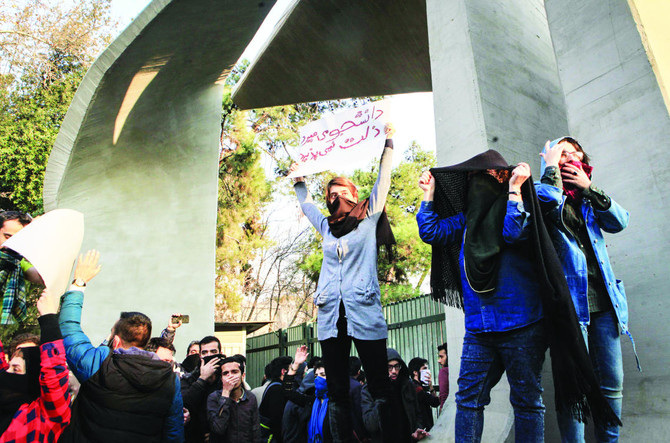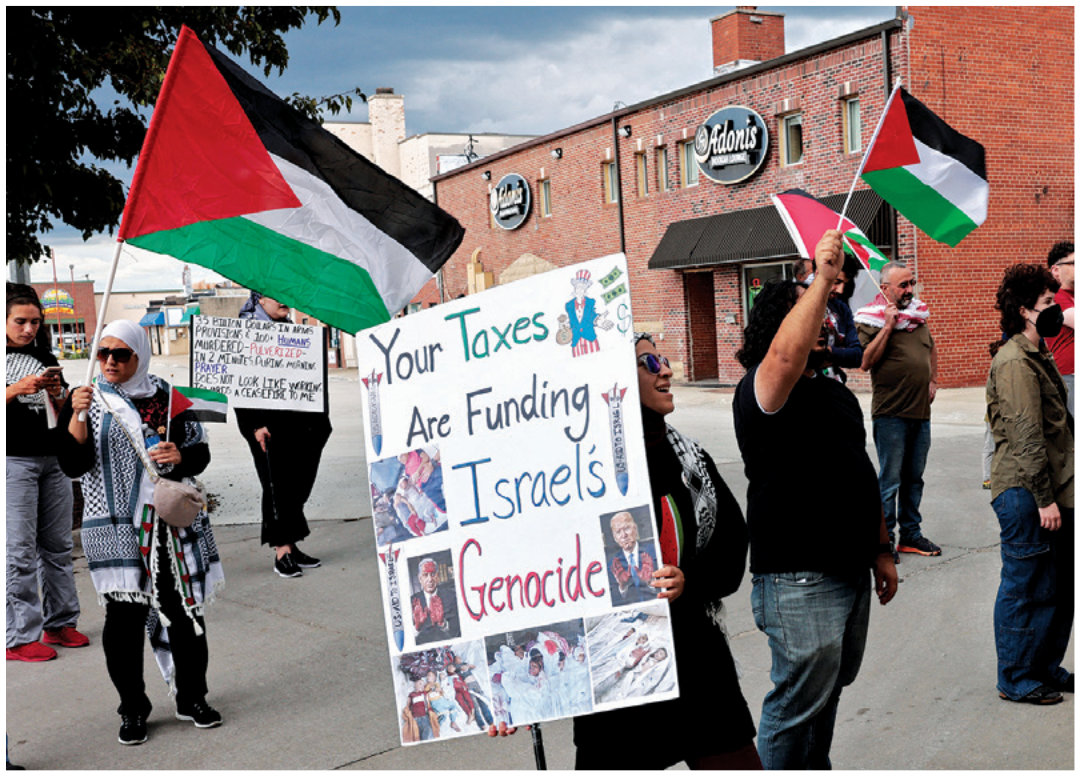DUBAI: Iran has seen its largest anti-government protests since the disputed presidential election in 2009, with thousands taking to the streets in several cities in recent days.
Travel restrictions and moves by the government to shut down social media networks have limited the ability of journalists to cover the ongoing unrest, which Iranian state television says has killed 12 people.
Here’s what we know so far:
How did the protests start?
The demonstrations began on Thursday in Mashhad, Iran’s second-largest city and the home of a famous shrine. The city is a conservative bastion and a stronghold of Ebrahim Raisi, a cleric who unsuccessfully challenged President Hassan Rouhani in last year’s election. Analysts suggest conservatives began the protests there as a means to pressure Rouhani. The protests then rapidly spread throughout the rest of the country of 80 million people.
What do protesters want?
Demonstrators initially focused on Iran’s flagging economy. Despite now being able to sell oil on the international market after the 2015 nuclear deal, Iran faces rising inflation and high unemployment. A recent increase in egg and poultry prices by as much as 40 percent, which a government spokesman has blamed on a cull over avian flu fears, appears to have sparked the protests. Protesters have chanted against Rouhani as well as Supreme Leader Ayatollah Ali Khamenei. Some have criticized Iran’s military support of Syrian President Bashar Assad, while others have praised the US-backed shah, who fled into exile in 1979 and died of cancer the following year.
Who is leading the protests?
So far, no central leadership has emerged. That’s in contrast to the 2009 Green Movement demonstrations, which protested hard-line President Mahmoud Ahmadinejad’s re-election amid widespread allegations of voter fraud. Those protests, Iran’s biggest since 1979, prompted a crackdown by Iran’s paramilitary Revolutionary Guard and its affiliates that saw thousands detained, dozens killed and others tortured. Its leaders remain under house arrest years later. While leaderless, these new protests have been fanned in part by an exiled journalist named Roohallah Zam using a mobile phone messaging app called Telegram .
How has the regime responded?
Iran says it temporarily shut down access to both Telegram and the photo-sharing app Instagram to “maintain peace,” limiting protesters’ ability to share images and publicize rallies. Facebook and Twitter are already banned. Uniformed and plainclothes police are in the streets, as are motorcycle-riding members of the Basij, a volunteer force under the Revolutionary Guard that helped carry out the 2009 crackdown. Rouhani himself has said Iran allows protests, and authorities often tolerate smaller, limited demonstrations and labor strikes. But Rouhani and other officials have warned that the government won’t hesitate to crack down on those it considers lawbreakers.
Has there been violence?
At least 12 people have been reported killed so far. Iranian state television said on Monday that security forces repelled “armed protesters” who tried to take over police stations and military bases, without elaborating. Pictures published by semi-official Iranian news agencies have shown water cannons being used on protesters in Tehran, as well as damage done by demonstrators to public property. Several hundred people reportedly have been arrested, though police say they’ve released many. Some videos circulated online show protesters welcoming police officers and demonstrating peacefully.
How has the world reacted?
US President Donald Trump has tweeted several times in support of the protests. The State Department has accused Iran’s leaders of turning “a wealthy country with a rich history and culture into an economically depleted rogue state whose chief exports are violence, bloodshed and chaos.” Rouhani has dismissed Trump’s criticisms, while many Iranians remain angry with the American president over his travel bans barring them from getting US visas, as well as his refusal to re-certify the nuclear deal.
Is Iran a democracy?
Elected representatives pass laws and govern on behalf of their constituencies. However, the supreme leader has the final say on all state matters. The Guardian Council, a 12-member panel half selected by the supreme leader and half nominated by the judiciary and approved by parliament, must approve all laws. The council also approves all presidential and parliamentary candidates, barring anyone who challenges the political system itself or advocates dramatic reform. Security forces answering only to the supreme leader, like the Revolutionary Guard, routinely arrest dual nationals and foreigners, using them as pawns in international negotiations.
What will happen next?
Demonstrators have called for more protests in the days ahead. While Rouhani has said the regime allows demonstrations, all so far have been held without police permission, which is illegal. Ultimately, the supreme leader will decide how to respond. As Cliff Kupchan at the Eurasia Group wrote in an analysis on Sunday: “When it comes to the regime’s survival, Khamenei calls the shots. And he’s got a lot of loyal and ruthless troops at his disposal.”






























